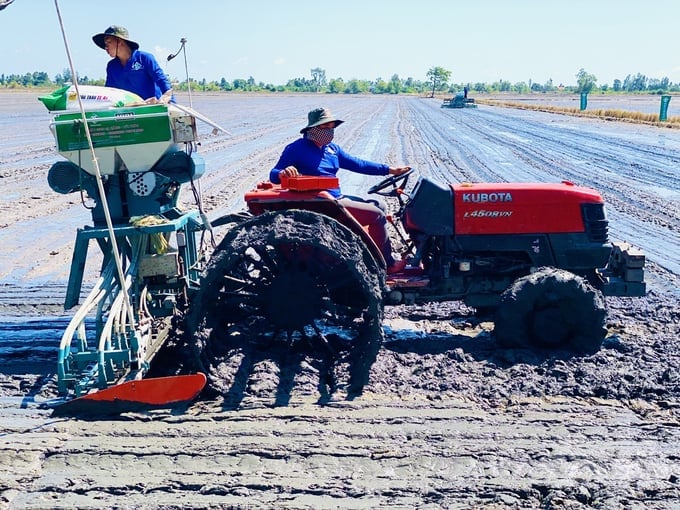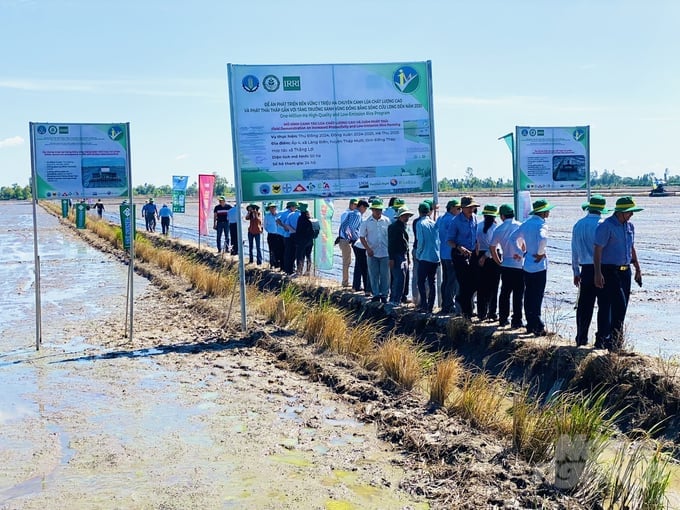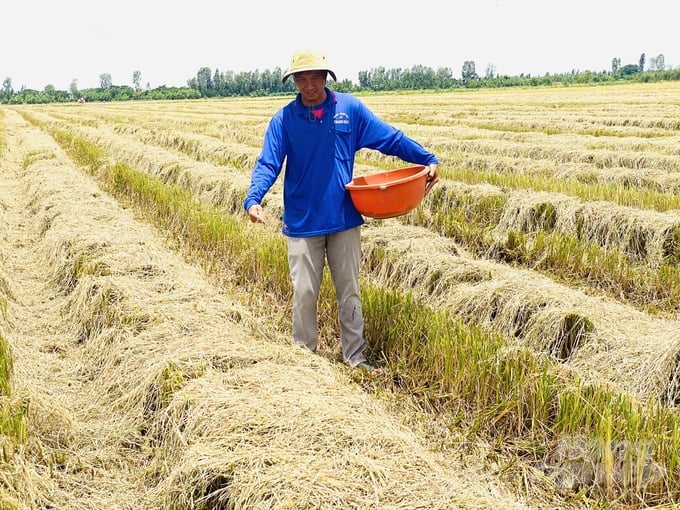November 27, 2025 | 13:22 GMT +7
November 27, 2025 | 13:22 GMT +7
Hotline: 0913.378.918
November 27, 2025 | 13:22 GMT +7
Hotline: 0913.378.918

Dong Thap is the third unit in the Mekong Delta to launch the Project for 1 million hectares of high-quality, low-emission rice linked to green growth in the Mekong Delta by 2030. Photo: Le Hoang Vu.
The Department of Crop Production (Ministry of Agriculture and Rural Development) in collaboration with the Department of Agriculture and Rural Development of Dong Thap recently launched the project for 1 million hectares of high-quality, low-emission rice linked to green growth in the Mekong Delta by 2030.
The project launch ceremony took place at Thang Loi Agricultural Service Cooperative (My Dong commune, Thap Muoi district). The cooperative is participating in a high-quality, low-emission rice cultivation model with an area of 50 hectares, involving 24 households starting from the summer-autumn, autumn-winter 2024, and winter-spring 2025 crops.
Farmers participating in the model receive 50% of the costs for inputs such as seeds, fertilizers, and Trichoderma bio-products for straw decomposition, and mechanization costs (cluster seeding/aerodynamic row seeding machines, drone spraying) from the government. The remaining 50% of the costs is mobilized from socialization support sources, including seeds, fertilizers, cluster seeding costs, greenhouse gas emission assessment costs, and field evaluation workshops, sponsored by companies like Binh Dien Fertilizer Joint Stock Company, Sai Gon Kim Hong Company, Tu Sang Co., Ltd, Bayer Vietnam Co., Ltd, and Vietnam Rice Co., Ltd.

In 2024, the entire province of Dong Thap registered to participate in the 1 million hectares of high-quality rice project with an area of 28,000 hectares, nearly 70,000 hectares in 2025, and up to nearly 162,000 hectares by 2030. Photo: Le Hoang Vu.
As the first cooperative in Dong Thap province selected to initiate the Project, Mr. Nguyen Van Hung, Director of Thang Loi Agricultural Service Cooperative, shared that the cooperative has long successfully implemented technical advancements in the fields, which have received strong support from the local community. The most recent examples include the SRP rice production model, production log recording, and the comprehensive mechanization of the fields. With the existing experience and the strong determination of its members, the cooperative is committed to effectively implementing this Project.
According to the initial agreement between Thang Loi Agricultural Service Cooperative and the service providers and companies, during the autumn-winter 2024 crop season, businesses will establish linkages and guarantee product purchase for the farmers.
Mr. Huynh Thanh Man, Head of Tam Viet Clubhouse (Thuong Thoi Tien town, Hong Ngu district), stated: “Tam Viet Clubhouse is one of the units selected to implement the Project starting from the autumn-winter 2024 rice crop. We farmers are very excited and confident about the positive outcomes the Project will bring. By participating in the Project, farmers will receive support to apply scientific and technical advancements like '3 reductions, 3 gains,' '1 must, 5 reductions,' and the application of 4.0 technology in the fields, which will help reduce production costs and increase profits.”

Farmers process microbial products to decompose straw in the fields, turning it into organic fertilizer for crops. Photo: Le Hoang Vu.
According to Mr. Nguyen Van Vu Minh, Director of the Department of Agriculture and Rural Development of Dong Thap, the launch of the Project aims to establish a specialized high-quality rice cultivation area with low emissions, linked to the reorganization of the production system along the value chain, and the application of sustainable farming practices to increase value. This will help the local area sustainably develop the rice industry, improve production and business efficiency, as well as the income and livelihoods of rice farmers, protect the environment, adapt to climate change, and reduce greenhouse gas emissions.
Dong Thap is one of the five provinces selected to pilot the Project in the Mekong Delta region. In 2024, the entire province of Dong Thap registered to participate in the Project with an area of 28,000 hectares, nearly 70,000 hectares in 2025, and by 2030, this area is expected to increase to nearly 162,000 hectares.
According to the 2025 plan, Dong Thap province will implement the Project in seven rice-growing districts and cities, including Tan Hong, Hong Ngu, Tam Nong, Thanh Binh, Cao Lanh, Thap Muoi, and Hong Ngu City, covering a total area of nearly 70,000 hectares. By 2030, the Project will also be implemented in Lap Vo district, with the goal of reaching a total area of 161,000 hectares.
Translated by Mai Quang Huy
/2025/11/26/4909-2-154329_878.jpg)
(VAN) Pearl grouper farming in HDPE cages not only delivers economic efficiency but also contributes to protecting the environment, creating jobs, and promoting marine-based experiential tourism.

(VAN) The model of making a living under the forest canopy through the agroforestry system in Van Son commune, Bac Ninh province, is expected to generate an annual income of approximately VND 30 million/ha.

(VAN) Many enterprises in Can Tho are harnessing natural energy and reducing greenhouse gas emissions in their production processes, thereby contributing to the promotion of a sustainable green transition.
/2025/11/24/3536-2-112800_176.jpg)
(VAN) Dong Nai now has tens of thousands of hectares of forests certified for sustainable management, and this area will continue to be expanded in the coming period.

(VAN) Vinh Ha hamlet (Dai Xuyen commune, Hanoi) is shifting away from small-scale farming as households adopt bioscurity into their breeder chicken models.

(VAN) Heavy rains make aquatic species more vulnerable to disease. Proactive water management and high-tech systems help farmers prevent outbreaks and protect yields.

(VAN) Greenhouses are shifting production mindsets in Binh Lu commune, enabling farmers to ‘weather the sun and rain’ and secure stable vegetable harvests throughout the year.